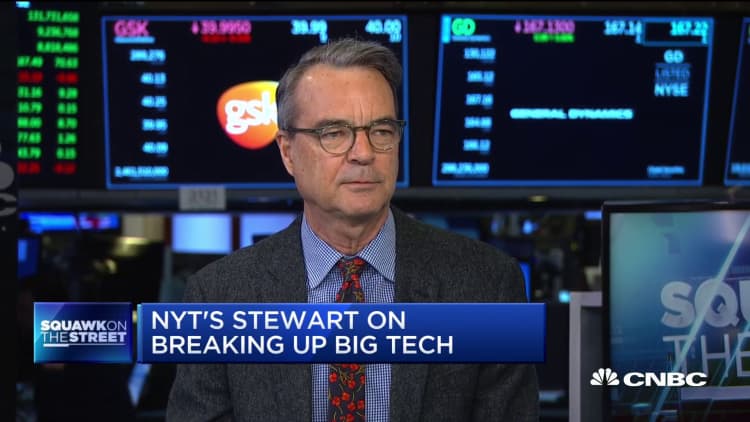Amazon CEO Jeff Bezos, to say the least, is having a rough start to the year. But don't expect him to lose focus.
That was Bezos' message during Amazon's internal all-hands staff meeting last week, when an employee asked the CEO if any significant changes are expected because of everything that's happened to him over the last two months. Bezos is currently facing an impending divorce, a tabloid scandal and a publicity nightmare stemming from HQ2's pullout from New York, among many other things.
"If you don't mind, just raise your hand, if maybe — just maybe — you've had a better start to your 2019 than I have. Anybody?" Bezos said, according to a recording of the meeting CNBC has heard. "I noticed that a couple hands didn't come up — I'm sorry for you guys."
Bezos went on to reassure the employees that he has no plans to step back and is still fully engaged with the day-to-day management of the company. He said:
"But seriously, no. I am as engaged and focused on Amazon as ever. I still tap dance into the office. I get to work with remarkable people. I get to live and work in the future. And that's where I like to be, so thank you."
It was Bezos' first public comment to employees addressing the concerns about his work at Amazon as he's dealing with a series of issues — both personally and professionally — that could potentially distract him from running one of the largest companies in the world. While the comments reaffirm his commitment to work, questions remain on how exactly Bezos will get through one of the toughest periods of his career, corporate governance experts say.
"Given the stress he's under, I would think it'd be rather difficult to continue running the company in a normal fashion," said Charles Elson, a professor and director of the corporate governance center at the University of Delaware.
Amazon declined to comment.
Risk factor
Elson said Bezos is in a "very difficult" situation that would make it impossible for almost anyone to focus completely on their job responsibilities. Amazon's board and shareholders, he said, should view that as a growing risk factor to Amazon, as it could potentially prevent Bezos from running the company "wisely and prudently."
"I don't know how you can compartmentalize and continue to operate as your fiduciary duty requires," Elson said. "At some point, someone's going to say something."
In January, Bezos announced his divorce from his wife of 25 years, MacKenzie Bezos. Soon, the National Enquirer reported that Bezos' divorce was due to his affair with TV personality Lauren Sanchez and that it possessed lurid photos of the CEO. About a month later, Bezos published a blog post detailing the extortion threats he said he received from the National Enquirer, going public with his fight against the tabloid.
At the same time, Amazon has had to deal with its own share of controversies. It abruptly canceled its plan to build HQ2 in New York City following criticism from local activists and politicians. Now, similar pushback is arising in Northern Virginia, the other location for HQ2. Amazon's earnings report last month disappointed many investors, while the company is facing new regulations in India that could make it more difficult to expand in the country. It also took a publicity hit when one of its cargo planes crashed in Texas, and a group of high-profile shareholders raised concerns about its facial recognition software called Rekognition.
Wall Street doesn't seem too worried yet. Amazon's stock is up roughly 10 percent this year, and in January, rose to briefly become the most valuable company in the world.
In the blog post about the National Enquirer, Bezos stressed that he's not distracted by the tabloid scandal, saying he's prioritizing his time because he has "other things he prefers to work on." Still, Bezos' divorce could potentially jeopardize his ownership stake and position at Amazon, as Washington state law could split his 16 percent share of the company in half.

Succession plan
David Larcker, who teaches corporate governance at Stanford University, said that while it's unlikely Amazon's board would even think about replacing Bezos at this point, it should at least take a closer look into what exactly is happening and how Bezos plans to get through all the issues.
That means Amazon's board should be talking to the company's most senior leaders to better understand the situation, and review its executive bench and succession plan, in case anything bad happens, he said.
"Stranger things have happened before," Larcker said.
In fact, Larcker's report in 2013 found that seven out of the 24 CEOs who got divorced between 2009 and 2012, or roughly 30 percent, ended up stepping down within two years of the divorce settlement. While Bezos is different from those CEOs, who were mostly nonfounders with little ownership stake, Larcker said Amazon's board should still be "a little more responsive" just given how unusual the situation is.
Perhaps the bigger lesson from all this is that CEOs like Bezos should be more mindful of protecting their privacy, according to John Core, a business professor at MIT. With the rise of social media and nonstop news cycle, people's privacy are no longer respected as it was in the past, and it's the CEO's responsibility to stay out of trouble, he said. That could result in a broader "transition period" in how other executives manage their privacy.
"There's no reason to be sending pictures of yourself across the internet," Core said.


